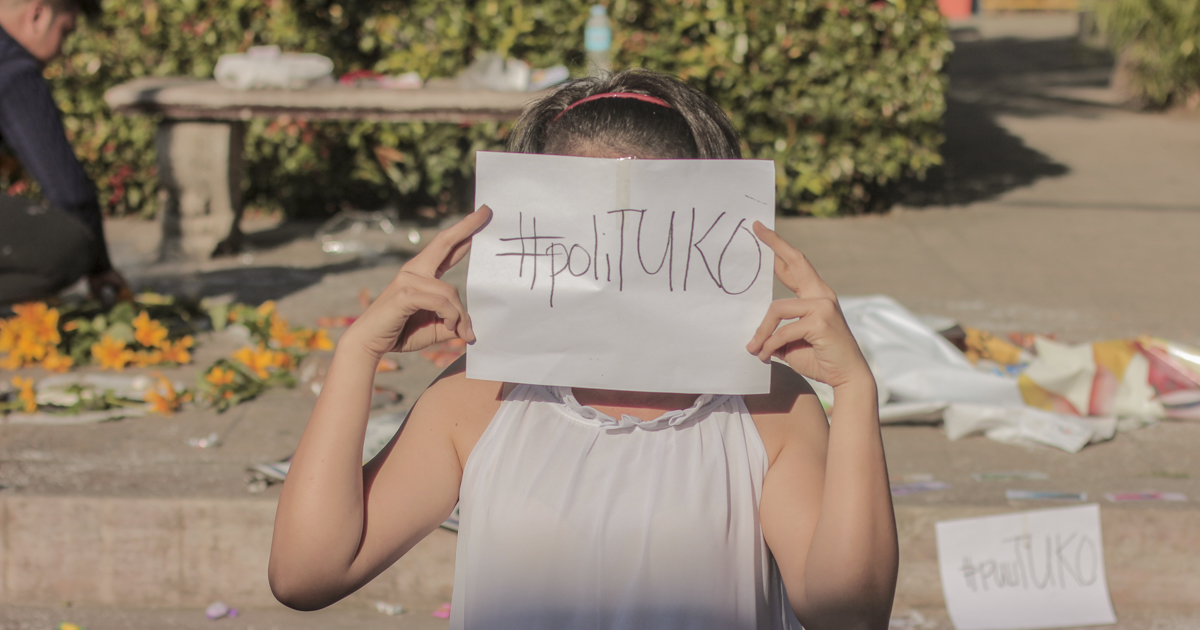
It was still early Sunday morning when I headed to church, but instead of the usual crowd, I was greeted with a scene that was straight out of the ordinary.
A lady in a white dress wearing a white mask over her eyes was sprinkling salt on the rough pavement while two men behind her were detaching campaign tarpaulins hanging on the walls. Holding handwritten signages which read “#poliTUKO”, people turned their heads and furrowed their eyebrows as this peculiar group arrived at the park.
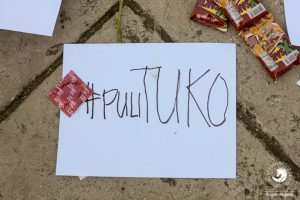
The lady then handed seemingly random items to bystanders including junk food, condoms and pills, as recipients’ eyes widened and their jaws dropped. Meanwhile, two boys climbed up on the stage platform and laid out fully bloomed yellow sunflowers in a circle as well as little red candles which they lit.
Then, a man wearing a fancy coat and tie holding a black garbage bag with something inside got up on the stage. “Tanggapin niyo itong munting regalo ko para sa inyo. Siya nga pala, huwag niyo akong kakalimutan sa pagkasenador sa susunod na halalan,” he then handed over the bag to another man seated on the stage wearing loose black sleeves.
But when the seated man said that he would not accept such offers, the one purporting to be a senatorial candidate went into a rage.
“Hindi namin kailangan ng pera at mga suhol mo. Ang kailangan namin ay tapat at totoong serbisyo,” said the man in a serious and deep tone.
Actors on their cue
After the entire performance, the group identified themselves as theatre artists from De La Salle Lipa (DLSL) namely, Jan Patrick Magpantay, a DLSL alumnus, Albert Jewel Marasigan, an incoming 2nd year BS Legal Management student and Crecelda Dimayuga-Roldan, adviser of Teatro Lasalyano.
According to these artists, the point was to open the eyes and minds of people on current national issues including bribery and corruption through their chosen artistic platform called “performance art”.
Unlike the usual stage play, performance art is single act which does not require nor follow a conventional plot. With this, it allows the artists to become more straightforward in bringing out their message to people.
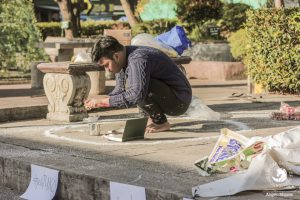
Furthermore, compared to typical stage plays which are direct and centered on stories about romance or drama of a fictional character, performance art focuses more on putting forward a stark concept or message, such as the country’s tragic political issues, albeit in a very non-conventional manner. Oftentimes, such performances are deemed ‘different’ or even ‘weird’ by most people, but its unusualness is a necessary quality of such acts to jarr or shock people into taking notice.
As a street performance, the event was also inclusive for all audiences as they held it in an open area which contrary to conventional plays, does not require entrance fees or venues which can only hold a limited number of people.
According to them, performance art is a better and more peaceful way of showing political defiance compared to explicitly aggressive acts and clamors during rallies.
“Mas pinili naming magbigay ng mensahe sa tao sa pamamagitan ng mas mapayapang paraan at ito nga ay ang live performance art,” Magpantay said.
Behind the scenes
Though most art performances seem to be improvised on the spot, the group revealed that such is not the case. The collection and preparation of materials, like tarpaulins and banners, necessary for the act was one of the distressing battles they had to deal with. Other problems also frequently arise when giving performances in public spaces. In fact, they also had to confront puzzled San Jose officials who did not fully understand what was happening.
“Hindi alam ng mga officials na may performance kami ngayon dito sa park. Kinabahan talaga ako noong sinita kami ng mga barangay tanod. I thought na baka maaresto kami at ireklamo ng vandalism,” Magpantay shared.
When asked if their art performance was against any law or ordinance of the town, Magpantay stated, “It is our right to assembly [kaya] walang masama sa ginawa naming performance.”
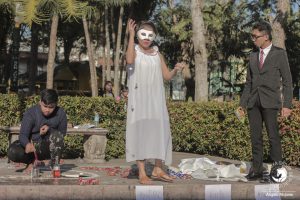
Homegrown folks of San Jose who saw the performance gave mixed reactions to the presentation. Though some expressed appreciation, it still received negative side comments for such a controversial way of tackling issues on politics.
One of the bystanders who watched the show, Raymond Lanople, said, “Nakakabigla na may nangyaring ganito dito sa harap ng simbahan na tungkol sa paparating na eleksyon. Mabuti na lamang dahil wala naman pala silang kinakalabang kahit na sinong politiko.”
Meanwhile, Christine Casao, who also finished the performance, elaborated, “Sa una, hindi ko talaga inasahan na may ganitong performance [dito] sa park. Pero para sa akin, maganda itong ginawa nila na magbigay aral tungkol sa pagpili ng tamang [uri ng] politiko na iboboto.”
In between props
Due to the unusualness of performance art, audiences are always inclined to ask, “But what does it mean?” Unexpected symbolisms used in the performance could pass unnoticed until their implied meanings are given away.
“We don’t want to give them the meaning of every object we used. We want them to have their own interpretation of what we did,” Marasigan said.
Roldan explained that she sprinkled salt around the platform as salt is a traditional aid in cleansing and removing impurities implying the need to cleanse the country’s political system of its dirt.
The wild sunflower, positioned in a circle, surrounding Magpantay who was seated cross-legged, symbolized the bright and prosperous future often promised by electoral candidates.
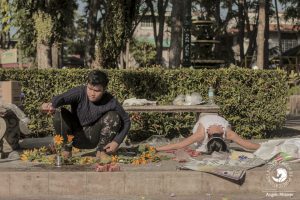
What surprised most the people was when condoms and pills were showered around the park. With intrigued looks, some children were seen being reprimanded by their parents for grabbing samples of the contraceptives, while other parents chose to explain its purpose.
To put it differently, according to Magpantay, the contraceptives in the act points out how the government today supports the Reproductive Health Law (RH Law) which insures universal access to methods of contraception, fertility control, and maternal care, which is against their religious beliefs as it is anti-life and immoral.
More so, Magpantay believes that RH Law does not promote responsible parenthood as it just allows people to fully rely on the given contraceptives of the government instead of having self-control.
In addition, junk foods and candies were also thrown by Roldan into the audience .
“Iyang mga kandidato, puro pagpapasweet lang ang alam nilang gawin. Tayo namang mga botante, sa konting matatamis na salita, bumibigay agad,” Roldan remarked.
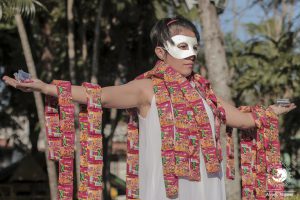
***
As the performance concluded, there were loud claps from those who appreciated, while an awkward silence lingered for those who were still puzzled by the spectacle.
Recurring issues on vote buying and bribing is not a new issue, indeed it is as old as the history of elections themselves. Through #poliTUKO and other performance plays are now gaining traction in the country, a new avenue to speak for the truth might gain more attention than conventional measures. Nevertheless, the future of this country entirely depends on us as to how we will use our voice and minds to unshackle ourselves from a prejudiced political system.